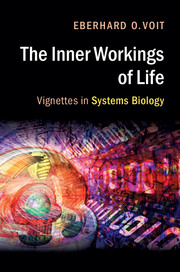Refine listing
Actions for selected content:
1413 results in Ebooks in network science
14 - Can't we all get along?
-
- Book:
- The Inner Workings of Life
- Published online:
- 05 May 2016
- Print publication:
- 10 May 2016, pp 109-116
-
- Chapter
- Export citation
19 - Let's meet in the agorá!
-
- Book:
- The Inner Workings of Life
- Published online:
- 05 May 2016
- Print publication:
- 10 May 2016, pp 154-159
-
- Chapter
- Export citation
Frontmatter
-
- Book:
- The Inner Workings of Life
- Published online:
- 05 May 2016
- Print publication:
- 10 May 2016, pp i-iv
-
- Chapter
- Export citation
11 - What hath God wrought!
-
- Book:
- The Inner Workings of Life
- Published online:
- 05 May 2016
- Print publication:
- 10 May 2016, pp 82-89
-
- Chapter
- Export citation
4 - Why?
-
- Book:
- The Inner Workings of Life
- Published online:
- 05 May 2016
- Print publication:
- 10 May 2016, pp 26-32
-
- Chapter
- Export citation
2 - I'd rather be fishin’
-
- Book:
- The Inner Workings of Life
- Published online:
- 05 May 2016
- Print publication:
- 10 May 2016, pp 9-16
-
- Chapter
- Export citation
5 - Simply engenious!
-
- Book:
- The Inner Workings of Life
- Published online:
- 05 May 2016
- Print publication:
- 10 May 2016, pp 33-40
-
- Chapter
- Export citation
13 - Time for a change!
-
- Book:
- The Inner Workings of Life
- Published online:
- 05 May 2016
- Print publication:
- 10 May 2016, pp 98-108
-
- Chapter
- Export citation
Gentle jargon
-
- Book:
- The Inner Workings of Life
- Published online:
- 05 May 2016
- Print publication:
- 10 May 2016, pp 165-195
-
- Chapter
- Export citation
12 - Tell me with whom you go and I'll tell you who you are
-
- Book:
- The Inner Workings of Life
- Published online:
- 05 May 2016
- Print publication:
- 10 May 2016, pp 90-97
-
- Chapter
- Export citation
9 - Emergence preparedness
-
- Book:
- The Inner Workings of Life
- Published online:
- 05 May 2016
- Print publication:
- 10 May 2016, pp 68-74
-
- Chapter
- Export citation
17 - The computer will see you now…
-
- Book:
- The Inner Workings of Life
- Published online:
- 05 May 2016
- Print publication:
- 10 May 2016, pp 138-145
-
- Chapter
- Export citation
15 - Love thyself and fight all others
-
- Book:
- The Inner Workings of Life
- Published online:
- 05 May 2016
- Print publication:
- 10 May 2016, pp 117-129
-
- Chapter
- Export citation
10 - Life without chaos?
-
- Book:
- The Inner Workings of Life
- Published online:
- 05 May 2016
- Print publication:
- 10 May 2016, pp 75-81
-
- Chapter
- Export citation
Index
-
- Book:
- The Inner Workings of Life
- Published online:
- 05 May 2016
- Print publication:
- 10 May 2016, pp 203-209
-
- Chapter
- Export citation
3 - Whizzes and apparitions
-
- Book:
- The Inner Workings of Life
- Published online:
- 05 May 2016
- Print publication:
- 10 May 2016, pp 17-25
-
- Chapter
- Export citation
Appetizer
-
- Book:
- The Inner Workings of Life
- Published online:
- 05 May 2016
- Print publication:
- 10 May 2016, pp vii-x
-
- Chapter
- Export citation
16 - A billion dollars for your thoughts!
-
- Book:
- The Inner Workings of Life
- Published online:
- 05 May 2016
- Print publication:
- 10 May 2016, pp 130-137
-
- Chapter
- Export citation

The Inner Workings of Life
- Vignettes in Systems Biology
-
- Published online:
- 05 May 2016
- Print publication:
- 10 May 2016
8 - Measuring Representational Style in the House: The Tea Party, Obama, and Legislators’ Changing Expressed Priorities
- from PART 2 - computational social science applications
-
-
- Book:
- Computational Social Science
- Published online:
- 05 March 2016
- Print publication:
- 07 March 2016, pp 225-245
-
- Chapter
- Export citation
